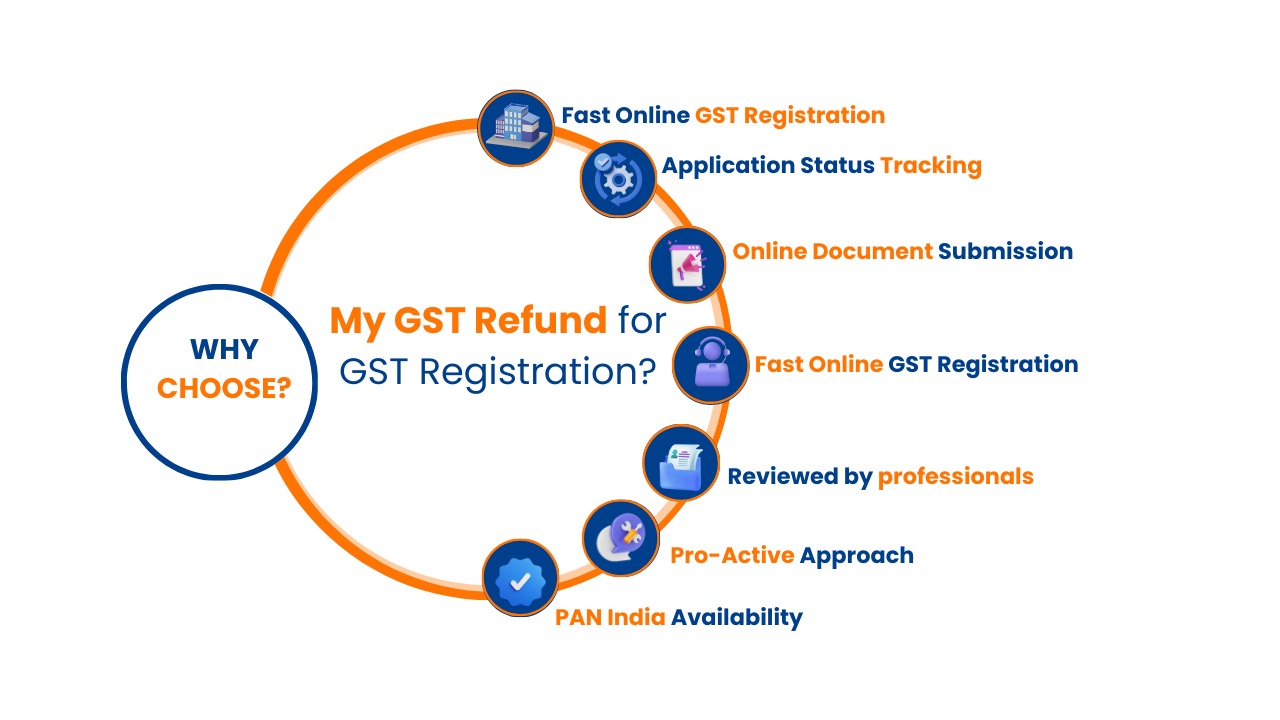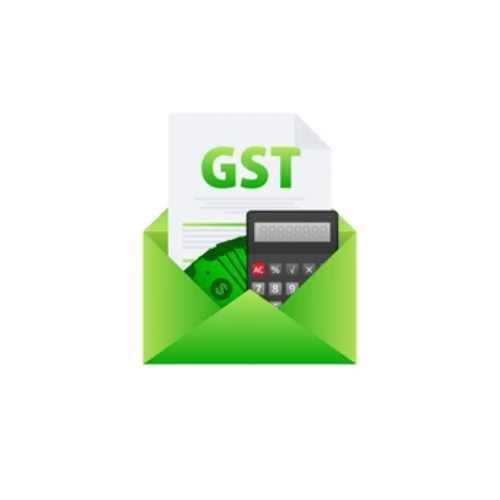
15,000+
Startups & MSMEs Trust us

Fast & Accurate
Get Gst Registration done Quickly

Expert Help
We help you every step of the way
What is GST registration?
Goods and Services Tax (GST) registration is compulsory for Indian businesses that have a certain turnover limit or are involved in the interstate supply of goods and services. After the consolidation of various taxes such as VAT, service tax, and excise duty, GST was implemented on July 1, 2017.
GST registration enables businesses to collect tax from the customer, take input tax credit, and maintain legal compliance.
Registration under GST is a must for those businesses with more than ₹40 lakh annual turnover for persons engaged in supplying goods, ₹20 lakh for persons engaged in service, and ₹10 lakh for special category states. It is also compulsory for e-commerce operators, interstate sellers, and the ones who have to pay tax under the reverse charge mechanism, irrespective of turnover.
Why Choose MyGST Refund for GST Registration?
No need to visit multiple offices. Get your GSTIN online with minimal effort.
Get regular updates on your GST registration progress with our expert assistance.
Upload all required documents safely and conveniently through our digital portal.
Our team carefully reviews uploaded documents based on their expertise.
We identify document discrepancies early to save time and prevent delays.
Our services are available across India to provide better local support.
99.9% success in Aadhar authentication & biometric verification at GST Suvidha Kendra.

Who Needs GST Registration?
Businesses with an annual turnover exceeding ₹20 lakh (₹10 lakh for special category states) in outward supply of goods and services
Casual Taxable Persons
Persons required to pay tax under reverse charge
Suppliers of online money gaming from outside India to Indian users
Suppliers of online information and database access services from outside India to Indian users
Input Services Distributor
Non-Resident Taxable Person
Suppliers of goods or services to government bodies
E-commerce sellers and service providers
Businesses supplying goods or services interstate
Documents Required for GST Registration
PAN Card (Firm/Company) or PAN of Proprietor
PAN & Aadhar (Indian Nationals) / Passport & Father's Name (Foreign Nationals)
Photo of partners/promoters with contact details
Company Incorporation Certificate or relevant registration document
Board Resolution/Authorization Letter (not required for Proprietor)
Digital Signature Certificate/Electronic Verification Certificate
Property documents (owned/leased)
.D85iQo6R.png)
Types of GST Registration for Business

Normal Taxpayer Registration

Composition Scheme Registration

Casual Taxable Person Registration

Non-Resident Taxable Person Registration
 Registration.png)
Input Service Distributor (ISD) Registration

SEZ Developer/Unit Registration

GST Practitioner Registration

E-commerce Operator
Start Your GST Registration Today!
Avoid delays and compliance issues—register for GST with MyGST Refund and enjoy a seamless tax filing experience. Our team is here to assist you at every step, from registration to GST return filing and e-invoicing compliance.
What is GSTIN? Understanding the GST Identification Number Format
On successful GST enrollment, businesses get a one-of-a-kind 15-digit GST Identification Number (GSTIN). This alphanumeric number acts as proof of registration and must be utilized across all GST-connected transactions, bills, and reports.

State code (such as 29 for Karnataka, 07 for Delhi)

Permanent Account Number (PAN) of the organization or person

Entity code (refers to the number of registrations for the same PAN in a state 1 for initial registration)

Default character Z (held by the government)

Checksum digit (for verification)
For instance, a GSTIN such as 29ABCDE1234F1Z5 represents a firm registered in Karnataka with the PAN "ABCDE1234F." The GSTIN promotes uniformity and assists authorities in monitoring tax compliance effectively.
Penalty for Non-Registration Under GST
Not registering for GST when obligatory may attract serious penalties and legal actions. The non-registration penalty varies according to the nature of the offense:
Late Registration: When a business registers late after the deadline, there is a late charge of ₹100 per day (₹50 under CGST + ₹50 under SGST) up to ₹5,000.
Running Without Registration: In case a business is required to pay GST but runs without registering, it is penalized with 100% of the tax liability payable or ₹10,000, whichever is greater.
Tax Evasion: Voluntary non-registration to avoid tax attracts prosecution, fines, and imprisonment based on the extent of evasion.
Non-registration also denies businesses the right to claim input tax credit, raising operational expenses. To escape penalties, businesses need to evaluate their eligibility and register in time.
Post-Registration Compliance: What to Do After GST Registration
After registering, businesses need to follow regular GST compliance to remain legally compliant and avoid penalties. Here's a checklist of important post-registration requirements:
GSTR-1: Quarterly or monthly filing of outward supplies (sales).
GSTR-3B: Quarterly summary return of sales, purchases, and tax paid.
GSTR-9: Annual return summarizing all transactions (obligatory for businesses with turnover over ₹2 crore).
Issue Tax Invoices: Create GST-compliant invoices for all taxable supplies, referring to GSTIN, HSN/SAC codes, and the breakup of tax.
Pay GST: Remit collected GST to the government on or before the 20th of the subsequent month.
Input Tax Credit (ITC): Avail ITC on procurements by matching invoices with GSTR-2A/2 B.
Non-compliance, like delayed or inaccurate reporting, invites a penalty of at least ₹200 per day (₹100 CGST + ₹100 SGST). GST software or availing the services of a tax expert can make it easier.
Frequently asked questions
Everything you need to know about the product and billing.
GST registration is the process by which a business or entity gets registered under the Goods and Services Tax (GST) Act. It makes the business compliant with GST laws, allowing it to collect tax on behalf of the government and avail of input tax credits.






